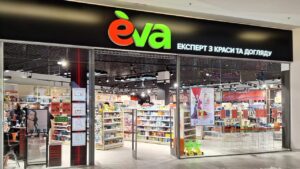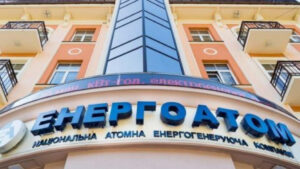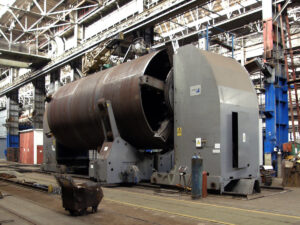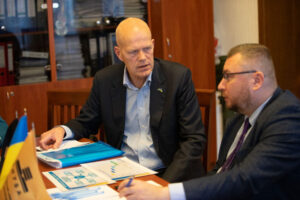
France’s Schneider Electric plans to buy back €2.5-3.5 billion worth of its own shares by the end of 2030.
The company expects to increase the profitability of its operations amid the development of the artificial intelligence market and growing demand for electrification solutions.
According to a press release from Schneider Electric, the company aims to increase its adjusted EBITA margin by 250 basis points in 2026-2030. Its previous target was to increase this figure by 50 basis points in 2024-2027.
Schneider Electric will seek to “capitalize on opportunities in the areas of electrification, automation, and digitalization,” said its CEO Olivier Blume, whose words are quoted in a press release published ahead of an investor event.
The company forecasts average annual revenue growth of 7-10% through 2030. In addition, it plans to sell assets with proceeds of €1 billion to €1.5 billion during this period.
Schneider Electric is a manufacturer of distribution and protection equipment, automation devices for the energy sector, and other equipment.
Its solutions play an important role in ensuring the operation of data centers.
Schneider Electric shares added 2.5% in price on Thursday trading in Paris. Since the beginning of this year, their value has fallen by less than 1%.

Traffic to the EVA.UA online store increased by 23% during Black Friday (from November 13 to December 2), compared to the same promotional period in 2024, with the average check increasing by 17%, according to the company’s press service.
“During Black Friday, traffic to the EVA.UA online store increased by 23% compared to the same period in 2024. On November 28 alone, it increased by 30%. On that day, we achieved a record attendance of over 1 million visits,” said Ruslan Sazonov, head of marketing for the EVA.UA online store.
At the same time, the average daily number of online orders during Black Friday increased by 25% compared to last year’s figure.
The average check of EVA.UA customers increased by 17% compared to last year’s Black Friday period. In EVA beauty stores, it increased by 12%. At EVA, growth peaked at 10%.
The largest sales growth across all channels was seen in the categories “Perfumes,” “Face and Body Care,” and “Hair Care.” The EVA beauty advent calendar became the absolute sales leader among the entire range on EVA.UA.
Vasylina Petlytska, director of the EVA beauty business line, noted the pronounced interest of buyers, especially from the western region, in gift sets. “Obviously, many people used Black Friday as an opportunity to buy gifts for St. Nicholas Day at a bargain price,” she said.
Rush LLC, which manages the EVA chain, was founded in 2002. As of early 2025, the chain had 1,109 stores in operation.
According to YouControl, the owner of Rush LLC is listed as Incetera Holdings Limited (100%), a Cypriot company, and the ultimate beneficiaries are Ruslana Shostak and Valeria Kiptika.
At the end of Q3 2025, Rush’s net income increased by 18.6% compared to the same period last year, to UAH 22.916 billion. Net profit decreased by 14.7% to UAH 1.7 billion.

JSC NAEK Energoatom analyzed previously announced open tenders, as a result of which the company initiated the cancellation of five tenders for purchases totaling approximately UAH 650 million.
“In order to update the expected purchase price, taking into account the reduced payment terms, the cancellation of five tenders with a total value of approximately UAH 650 million has been initiated,” NAEK reported on Thursday.
Energoatom noted that the company continues to take measures to optimize and improve business processes in the field of procurement.
“In order to prevent a selective or subjective approach to determining the order of payments under concluded contracts, a corresponding system algorithm is being developed,” NAEK said.
The company has also set up a commission to analyze and prioritize production payments.
As previously reported by Energoatom, in order to strengthen cooperation with contractors and taking into account the economic situation in Ukraine, NAEK has significantly reduced the payment deadlines in draft contracts for the supply of goods, performance of work, and provision of services during the period of martial law.
“The updated approach to the formation of contractual terms for setting payment deadlines is related to a review of the financial burden on the company,” the company explained.
Energoatom asserts that for the stable operation of the company in conditions of increased challenges, it is also important to take into account the criticality, importance, and urgency of procurement and strict adherence to the principles of public procurement defined by Ukrainian legislation.

JSC Kramatorsk Heavy Machine-Building Plant (KZVV, Perechin, Zakarpattia region), almost 97.7% of whose shares are owned by former MP Maksym Yefimov (Restoration of Ukraine group), earned nearly UAH 1.379 billion in net profit in January-September this year, twice as much as in the same period in 2024.
According to the company’s published financial report, its net income for this period increased 2.6 times to UAH 34.542 billion.
As reported, in the first half of this year, the company increased its net profit fourfold compared to January-June 2024, to UAH 1.233 billion, and its net income 3.5 times, to UAH 21.446 billion.
Thus, in the third quarter of this year, KZVV reduced its net profit by 2.5 times compared to its July-September 2024 figure – to UAH 146.6 million, but increased its revenue by 85% – to UAH 13.1 billion.
As reported, KZVV, which was relocated from Kramatorsk to Perechin in the summer of 2022, manufactures, among other things, wind turbines (WTGs) for Friendly Wind Technology.
KZVV specializes in universal special-purpose machine tools for the energy, metallurgical, oil and gas, machine-building, and railway transport industries, as well as machine tools for single and small-batch production.
Back in 2022, KZVV’s net income was UAH 119.38 million, and its net loss was UAH 134.68 million.
At the beginning of 2025, the plant employed almost 2,000 workers, compared to 296 in 2022.

When the pace of transformation in the labor market exceeds all forecasts and economic recovery moves in waves, one thing remains unchanged: people become the main strategic advantage of business.
That is why, at the end of the year, the Ukrainian HR community will gather at the 18th PEOPLE MANAGEMENT CONFERENCE — an event where decisions are born out of dialogue, analytics, and honest conversations about what shapes the working environment of the future.
We will talk about the shortage of human capital, team burnout, and the rapid integration of AI. Such changes are already shaping a new management architecture and forcing businesses to rethink their approaches. Therefore, the focus of the conference is shifting from HR as a function to people as the strategic core of business development.
The program consists of three thematic blocks:
Speakers include:
The conference will be a space where analytics, case studies, and strategic ideas are transformed into understandable solutions for HR directors, recruiters, L&D and T&D leaders, business owners and managers, team development specialists, and anyone who works with human capital.
The event will take place on December 19, 2025, in Kyiv (Ramada Encore Kyiv Hotel) and online.
400+ participants
Organizer: KA Group
Title partner: Work.ua | Official partner: Linkos Group
18’PEOPLE MANAGEMENT CONFERENCE is the key event of the year, where a new culture of leadership is being formed that will shape the future of business, teams, and Ukraine.
Contact us for special offers:
info@kagroup.ua | +38 (063) 247 94 74
Interfax-Ukraine – information partner

Kyiv National University of Construction and Architecture, together with the Swedish organization V94, is launching the SAFER Reconstruction project, aimed at training specialists in occupational health, safety, and the environment (HSE). The training process will be organized by the Vinnytsia Professional College of Construction, Architecture, and Design, a structural unit of KNUCA. The university will coordinate the program and provide expert support. This was announced by Rector Oleksiy Dniprov.
As part of the initiative, 30 Ukrainian veterans will undergo training to become HSE coordinators and implement EU standards in the construction industry during the reconstruction of Ukraine.
The training program will combine a theoretical component, practical training, and a module on democratic values and European integration. The program is currently being adapted to current market needs in compliance with Ukrainian and European standards.
KNUBA will provide coordination and academic support for the training process. The university’s role includes mentoring Vinnytsia College teachers, providing expertise in the preparation of training materials, quality control of educational content, and participation in the development of the theoretical and practical parts of the program. The KNUBA Institute for Reintegration, Rehabilitation, and Professional Development of Veterans “Architecture of Sustainability” is actively involved in the implementation of the program and is responsible for supporting participants and identifying their educational needs.
The SAFER Reconstruction project brings together an international consortium of partners: V94 – management and coordination, BDO Consulting – training of trainers, Vinnytsia Vocational College – implementation of training, Confederation of Builders of Ukraine – access to practical training at construction sites, Ukrainian Veterans Fund – selection and support of participants, Association of Civic Education Teachers – teaching of EU democratic values.
The project is funded by the Swedish Institute, a government agency of the Swedish Ministry of Foreign Affairs that supports international educational, cultural, and democratic programs. The Institute works to strengthen global cooperation, promote sustainable development, develop democracy, and engage citizens in public life, which is in line with the main objectives of the project in Ukraine.
V94 was founded in 2022 to promote Ukraine’s recovery, in particular by using Swedish experience to develop vocational training in the construction sector.